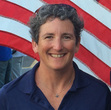Carol Newman Cronin's Blog, page 25
February 18, 2021
What a Long Strange Sailing-Free Winter It’s Been
I am SO hungry to go Snipe sailing, I might just have to chew on a line and pretend it’s a mainsheet.
Since 1991, I haven’t lived through an entire winter without a few sailing escapes to somewhere warm. For the past decade, Florida Snipe regattas have been the usual excuse for a break (both mental and physical) from the gray-on-gray workaday world of a New England winter. Tropical sailing is a technicolor refill for my internal image reservoir—as well as a chance to re-sharpen rusty racing skills and catch up with friends.

This year, driving south seems more risk than reward—and, until most of us are vaccinated, flying is out of the question. So I’ve been using this forced down-time to muscle through both boat and writing projects, grateful to have plenty of work, a warm house, a full belly, a view of the water, and stimulating conversations (mostly about sailing) almost every evening.
But longer-term, I know so much inside time—and all this damned productivity!—is depleting my mental reservoirs. My life is a well-earned balance between writing and sailing; take either one away, and eventually I’ll really go off the deep end. The only question is when: can I stay sane and happy until May, when we’ll be able to sail locally again?
That uncertainty has turned this winter into a teeter-totter between two bad options. Is it worth the infection risk to drive to Florida for a regatta that, in the big picture, means nothing? Can I sustain my mental health with crossword puzzles, rigging projects, and watching the America’s Cup?
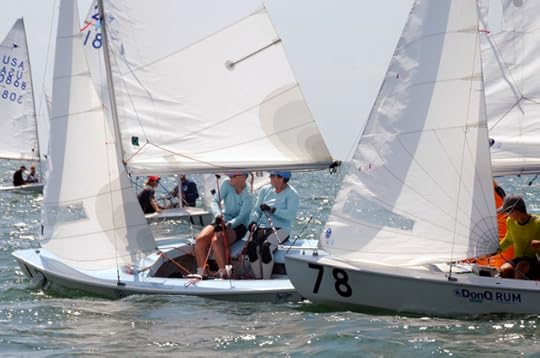 Rounding the leeward mark at the 2015 DonQ Regatta in Miami, FL. Photo: Blake Middleton
Rounding the leeward mark at the 2015 DonQ Regatta in Miami, FL. Photo: Blake MiddletonIf I stay home, you might see my headshot on the post office wall. If I take the leap and go, I could become part of the problem. All I can do is trust my gut, and make my best guess about what will look best come spring.
Fortunately, this long strange trip of a winter has made something else crystal clear: planning is completely over-rated. And I’ve just located a salty piece of line…. so for now, I’m going to sit tight, chew away, and pretend I’m trimming a mainsheet.
Stay well, all!
The post What a Long Strange Sailing-Free Winter It’s Been appeared first on Carol Newman Cronin.
February 11, 2021
Book Review: An Embarrassment of Mangoes
It’s winter, and unlike most years I won’t have the luxury of a February Florida escape. Instead I’ve been escaping into books—and apparently, many of you are too. (Did you know book sales increased more than 8 percent in 2020?)
With gray on gray the theme outside my window, I’ve been craving technicolor stimulus. So when a book about A Caribbean Interlude surprised me in the post (a present from cruising friends), I instantly pulled back its water-blue cover and dove in. Now that I’ve finished, I strongly encourage you to do the same.
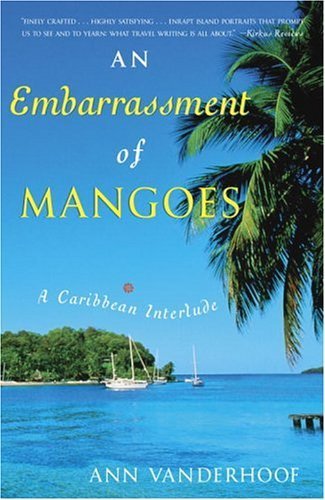
The book follows 40-something author Ann Vanderhoof and her husband Steve as they follow their dream and leave Toronto for a two year cruise to the Caribbean. Ann is quite new to sailing when they first set out, and Steve has only a little more experience. Still, they feel their way through buying and provisioning a boat, pay down their debt and rent out their house to make sure the cruising kitty doesn’t run dry, and head down the Hudson River (mast on deck) until they reached the Atlantic. Along the way, they learn what they need to know, mostly through the school of hard knocks.
Their route follows the east coast cruiser path designed to minimize offshore miles rather than time to a final destination: “Down the ditch” to Florida, a hop to the Bahamas, and then a series of island hops interspersed with upwind slogs across the Mona and Anegada Passages. They make it as far south as Trinidad and spend the summer watching for hurricanes south of “the box” (a wide band from 12-35 degrees North, where their insurance will not cover named storms during hurricane season). Along the way they learn to adjust their expectations of island phrases like “jus’ now,” and experiment until they come up with their favorite versions of various local dishes. Vanderhoof is a food writer, and she learns about local culture through cooking with the locals (just like Jane Sigal!). A great example is ‘ti punch:
“The before-dinner drink of choice in the French West Indies, ‘ti punch has the same mystique there that the martini does in North America. In Martinique and Guadeloupe, it’s said you can judge the qualify of a restaurant by its ‘ti punch. And, like the martini, it demands a glass all its own—a small, squat tumpbler that often bears a colored decal advertising the brand of rum the drink contains.”
Vanderhoof learns to make ‘ti punch from an expert, the self-proclaimed Minister of Rum. Though he’s a cruiser rather than a local, he’s a lifer in the islands who’s written books about the various island rums. He even brings along a proper swizzle stick when he comes to their boat: “One of his trimmed twigs with a “propeller-like end for stirring.”
Though they spent time in many islands, they really settle into Grenada (which was also my favorite in 1986, and I didn’t appreciate or explore it nearly enough). They get to know the locals more than most cruisers do, embracing one family in particular. We also meet other cruisers, a random mix of lifers and other couples who are enjoying an extended yet temporary break from “real” life.
Vanderhoof doesn’t hide the lows or try to oversell the joy of the cruising life; she simply shares their adventure in a series of easily digested and carefully themed chapters. At the end of each is at least one recipe, usually based on whatever’s freshly available. When life gives you an Embarrassment of Mangoes, make Mango Crisp.
So if you, too, are missing your usual tropical escape this year (or using this time-out to plot a cruising escape of your own), read this book. Originally published in 2004, many of the specifics are probably out of date… but the inspiration and technicolor stimulation of a Caribbean Interlude will be the perfect escape from our long winter of gray on gray.
PS Are you on Facebook? If so, join the Coastal Fiction Book Club! Every week, I offer up an example of coastal fiction (and sometimes non-fiction, like An Embarrassment of Mangoes). Discussion often ensues, a nice distraction that usually teaches me something. All you need is a good attitude! Here’s how to join
The post Book Review: An Embarrassment of Mangoes appeared first on Carol Newman Cronin.
February 4, 2021
Vendée Globe: The Sailing is the Easy Part
Ever since the Vendée Globe started last November, this singlehanded unassisted race around the world has dominated our household conversations. But it wasn’t until just before last week’s spine-tingly close finish that I spotted a significant commonality between three months circling the globe under sail and my own weekend dinghy races: in both cases, the Sailing is the Easy Part.
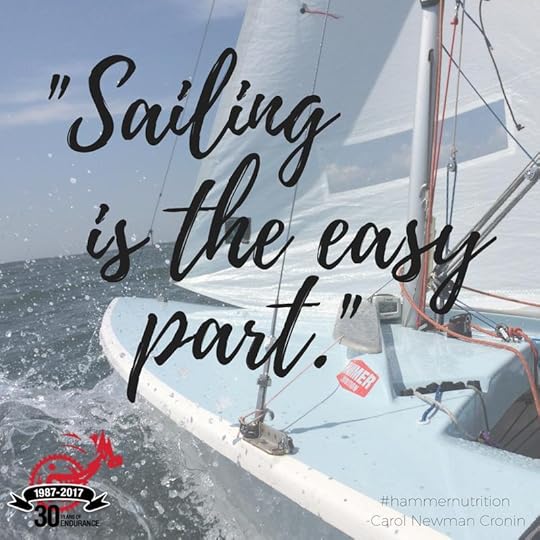
Of course the Vendée is quite different from a few afternoon hours of Snipe racing. The incredible heroes of the Vendée handled gales and calms, climbed the mast whenever something aloft needed fixing, and passed from winter to summer and back to winter again. But I’m sure that pushing away from that dock on 8 November 2020 inspired the same relief I always experience when heading out to a start: the rules, priorities, and expectations instantly become clear.
After they finish, of course, that clarity will once again be drowned out by the uncertainty and confusion of returning to shore, especially in our current world of isolation and lockdown. I wouldn’t blame any of the sailors for wondering if they should just head back out to sea again, because the Sailing is indeed the Easy Part—especially this year.
Congratulations to all the Vendée Globe competitors, and thank you for adding so much inspiration and distraction to our family dinners. May your transition back to what the rest of us call “normal life” be easier than expected—and a chance to absorb and appreciate just how much you’ve each achieved.
The post Vendée Globe: The Sailing is the Easy Part appeared first on Carol Newman Cronin.
January 28, 2021
The Best Way to Buy Books
Today, a message from our sponsor: I’m going to explain the many alternatives you have for buying books. If you make it all the way through to the end, you’ll be rewarded with a SPECIAL OFFER!
What’s best for the author?I’ve published four books (so far) with three different publishers, and I often get asked what buying option best supports me, the author. Since I prefer to put my time into writing rather than perusing the fine print of various contracts, here’s my answer: buy where it’s convenient, and then when you’ve finished reading please leave a review. Sharing your thoughts will really help a book’s visibility on Amazon, Goodreads, or Bookbub—especially if you copy/paste to all three.
I would also love to join your next book club meeting, so please consider Ferry to Cooperation Island (or one of the others) as your next group read.
Now that we’ve got the introductions out of the way, here are your book-buying details, organized by format.
(Don’t forget that special offer at the end.)
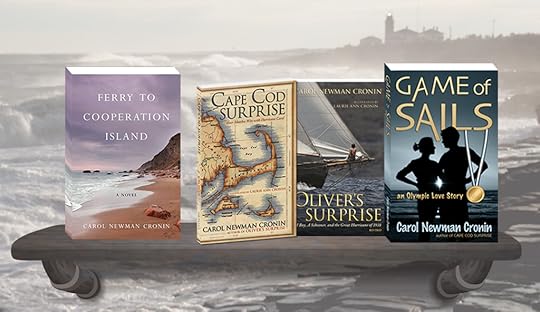 Buy a paperback
Buy a paperbackI love the feel of holding an “actual” book in my hands, and I tend to remember books better when I read a paper copy. Paperbacks also make a great gift.
Rhode Islanders can pick up signed copies of Ferry to Cooperation Island at the following stores: Island Books, Conanicut Ship’s Store, Fuller Gallery, and Savoy Bookshop and Café. The Jamestown stores also have copies of Oliver’s Surprise and Cape Cod Surprise in stock.
Everyone else can buy a paperback of FERRY and the two Oliver books from bookshop.org—which marries the convenience of e-tail with the feel-goodness of supporting the local independent bookstore of your choice. Game of Sails is only available on Amazon.
Buy an ebookThere’s no denying the instant gratification of discovering an intriguing story and, moments later, seeing it appear in my iPad’s library. All four of my novels are available wherever ebooks are sold. Click on a title below to purchase from your favorite e-tailer (or just type the book’s title into your search bar).
AudiobooksFERRY and The Oliver Series are available as audiobooks on most subscription sites (including my favorite, libro.fm, where a portion of my subscription helps support the independent bookstore of my choice). Most sites offer a free one-month trial (which includes a free book).
You can also buy single audiobooks through Author’s Direct or Chirp.
For more detail, read Audiobooks: A World of Their Own
Borrow a copyLibraries are a great resource, and all four books should be available through inter-library loan. If not, please let me know and I’ll try to help you sort out the details.
SPECIAL OFFERIf you would like a personalized paperback of any (or all) of my books, I’m offering a special deal this month: buy one, get one free (shipping included). Email me and we’ll sort out the details. Offer expires January 31, 2020.
Thanks for reading and buying and reviewing!
The post The Best Way to Buy Books appeared first on Carol Newman Cronin.
January 21, 2021
America’s Cup: One Affordable Trickle Down
For non-sailors, our sport is a rich person’s game personified by the America’s Cup: a white-capped playground of ego, selfish billionaires, and the worst of American exceptionalism.
While sailors know there’s a wide range of budgets in our sport, we often share this jaded view of the Auld Mug. We complain about how expensive it is, how much ego is involved, whether any of the technological advances will really find a useful home in mainstream sailing. But last Sunday, we saw something that we can apply to our own racing regardless of budget: international sportsmanship.
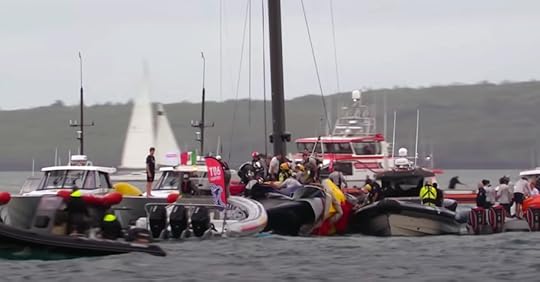
If you haven’t already seen it, here’s the boat-breaking capsize of American Magic, a heart-stopping example of comeback transformed to crisis. Thanks to a squall that hit just as they rounded their last mark of the weekend, the team went from a solid lead to a holed boat—a disaster that will keep them from competing in next weekend’s round robin.
In the hours that followed, everyone—every America’s Cup team, as well as all the local authorities—rallied together. First they kept the boat from sinking. Next, they towed it—backwards, at a crawl—home to the team base. (Isn’t it amazing what people can accomplish when they work together?)
When the boat finally lifted out of the water shortly before midnight local time, the gaping hole in the hull was visible to all. It was a graphic reminder of how thin the safety margins are on these bleeding edge craft when, as Terry Hutchinson would put it, something goes pear-shaped.
Holes in boats can be repaired. Electronics will be replaced. American Magic has both the resources and the leadership to come back stronger from this disaster. And yes, that’s thanks to ego and billionaires—as well as to Auckland’s fantastic boatbuilding expertise.
But the image that will live on in my own mind is from the cleanup: Peter Burling (skipper of defending Emirates Team New Zealand), standing on the bow of their chase boat, hauling American Magic’s sail out of the water. Dozens of other competitors helped too, of course; Burling (who’s won two Olympic medals as well as the 2017 America’s Cup) was just the most visible. Sportsmanship, personified.
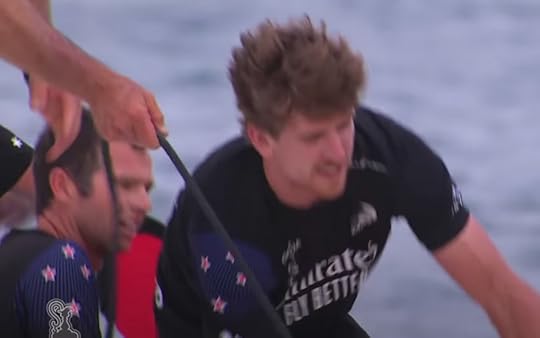
So the next time we’re all complaining about the Auld Mug, let’s also remember that this pinnacle of our sport creates heroes. We often equate heroism with winning—medals, trophies, against all odds. All of which might require ego, selfishness, and maybe a few extra dollars.
But when we see our heroes simply reaching out a helping hand to a competitor in need, it inspires us to do the same. And even if we don’t have any commas at all in our own race budgets, that’s trickle-down we can count on.
The post America’s Cup: One Affordable Trickle Down appeared first on Carol Newman Cronin.
January 14, 2021
How To Make Waves with Fiction
Last week, I was included in the winter Arlington Author Salon; the theme was “Making Waves.” It was a creative way to link together the authors of three quite different books: a memoir about a mixed race family, a novel about a ferry captain, and a history of Jewish Punk. Preparing for it also inspired some fresh thinking about the characters in Ferry to Cooperation Island and how they each, in their own way, “make waves.”
Of course the book contains plenty of literal waves from both sailboats and powerboats. But those are so obvious, I’ll skip right to the figurative waves that three characters make as they set sail through the story. That will lead us to my new conclusion: that fiction itself can make waves.
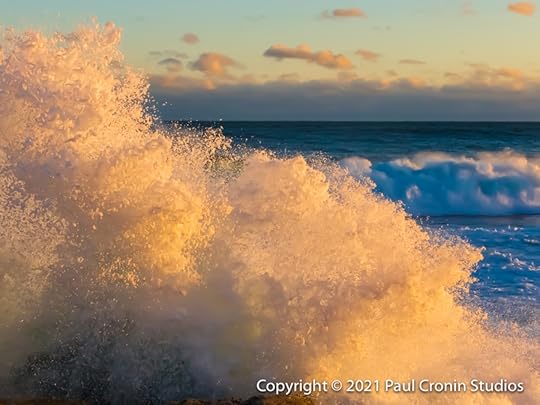 James
JamesOur favorite ferry captain makes waves by learning to cooperate with others. (This seems especially timely, as cooperation is something so sorely lacking in the world.) Working with others seems natural to me, but James was raised to be a lighthouse keeper and trained to do everything himself. He has to learn—to let himself be taught—that cooperation is the best way forward. (I wish I could send him down to DC.)
CourtneyThe captain who replaces James makes waves just by showing up, like a stone tossed into the middle of a very quiet pond. She also shows us how much harder it is for James to be replaced by (as he puts it) a “girl.”
MavisThis Narragansett Indian makes waves by learning independence. Although I knew nothing about the Narragansetts when I started writing the book and only know a little more than nothing now, Mavis was one of the easiest characters to write. Many of what I call “Mavis metaphors” (though most are really symbols) appeared in the very first draft, survived years of editing and revision, and now show up in the final book; let me just pause to point out how rare that is. Simple but elegant, they communicate so much more than the words themselves. Here’s one great example of how talking about her rock-hopping present showed me her untapped depths, when I stopped to reread what “we” had written:
Fiction Makes WavesA fragile edge of rock broke off under her right foot. For a moment Mavis thought she’d fall, straight down onto another sharp piece of ledge ten feet below. Instead, without thinking, she righted herself and kept climbing.
Last but certainly not least, joining two non-fiction authors for an evening book discussion forced me to think about why fiction is so important. Why should we even bother reading about people who don’t actually exist, or about an island that isn’t real? What I told the audience is this: I believe fiction is the best way to understand the lives of others. By talking in my head, Mavis showed me what it felt like to climb a rocky cliff in her bare feet—something I could never experience otherwise.
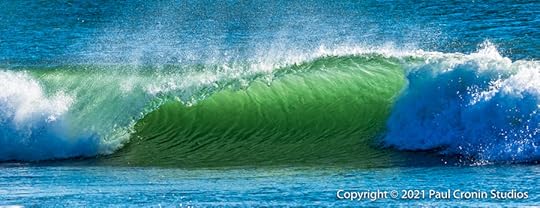 Thanks for the Salt Spray
Thanks for the Salt SprayI like to think I mesmerized the audience with my words, but the star of the show was Paul’s photos. Arlington Author Salon encourages participants to share something that “tickles the senses,” and I’m sure his pictures are why, after my presentation, the host said, “I think I got some sea spray during that reading.” See more at paulcroninstudios.com.
Watch the recording here. To learn more about the two other authors who presented, drop by the Arlington Author Salon website. (If you want to learn more about me, drop me an email.)
We are all starving for human interaction, and it was a real treat to get out of my own fiction bubble, hear other authors talking about their work—and absorb a little positive feedback. Virtual events aren’t the same as in-person ones, but the warmth and community of the Arlington Author Salon shone through—providing exactly the inspiration I needed.
Here’s to Making Waves with fiction, both figuratively and literally!
The post How To Make Waves with Fiction appeared first on Carol Newman Cronin.
January 7, 2021
Rod Davis: Why You Need His Wisdom in 2021
I’ve quoted Rod Davis so many times, I should probably send him royalties. His column is one of the main reasons I’ve subscribed to Seahorse Magazine for over 20 years—which, coincidentally or not, is how long he’s been writing for them. Two of my own blog posts have been directly inspired by his writings (America’s Cup: Rod’s Wisdom and 2020 Vision: Think Like a B-Teamer).
So it was a HUGE treat to spend an hour on Skype talking with Rod, at the tail end of my very strange 2020 summer—and just as New Zealand (where he’s lived since 1987) was coming out of their own (successful) lockdown. The excuse was a profile of a guy who, as the Seahorse headline so aptly puts it, requires no introduction.
 Rod Davis (bow) won Olympic gold in 1984, sailing the Soling with Ed Trevelyan and Robbie Haines. (They also won the US Trials in 1980.) In 1992, Rod won Star silver with teammate Don Cowie.
Rod Davis (bow) won Olympic gold in 1984, sailing the Soling with Ed Trevelyan and Robbie Haines. (They also won the US Trials in 1980.) In 1992, Rod won Star silver with teammate Don Cowie.Impressive but humble
Though we did spend a few minutes commiserating on how to deal with a rescheduled 202One Olympics and whether the Games will actually happen (“I’m glad I don’t have to make that decision”), mostly we looked in the rear view mirror. Rod’s has won two Olympic medals and either sailed or coached in every America’s Cup from 1977-2017. He also won the Congressional Cup twice (for two different yacht clubs, in two different countries). These days he’s downsized to the OK Dinghy, where he regularly beats up on much younger competitors.
But the reason I’m such a fan is his ability to step back and analyze performance, without losing sight of the details. He’s also been known to coin new words, such as humbilizing (or, in Seahorse, humbilising). As I put it in the piece, “Self-deprecating kernels of wisdom shoot across the airwaves in a mix of native California drawl and Kiwi twang, further muddled by a worldly mix of word choices and slang.”
Passion wins
It’s not, apparently, his writing skills that got him that Seahorse gig. One of the surprising personal details I gleaned was that Rod failed high school English and creative writing several times, until “they just gave up and turned a blind eye.” Yet another lesson: passion can take you farther than high school failures might indicate.
I could go on about Rod all day long, but instead I’ll leave you to read the profile. Seahorse has graciously allowed me to share it in full, but to read future Rod wisdom (and, in the January issue, Julian Bethwaite’s More for Less?) you’ll have to subscribe. The printed magazine can be a long wait until it arrives in a US mailbox, but the e-version arrives on the day of publication no matter where you are in the world (and it’s cheaper, too).
Thanks to Seahorse for this opportunity, and thanks to Rod for taking the time to share more of your wisdom. (Let me know your royalty rate on pithy but humbilizing quotes.)
What a great way to kick off 2021.
Rod-Davis-SeahorseDownload
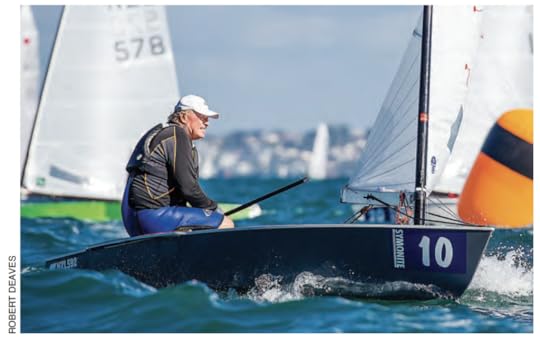 Rod finished an impressive 9th in the 2019 OK Dinghy Worlds. He was 20 years older than anyone else in the top 10.
Rod finished an impressive 9th in the 2019 OK Dinghy Worlds. He was 20 years older than anyone else in the top 10.Previous Seahorse profiles
Rod Johnstone: An Amazing Legacy of Yacht Designs
A Final Conversation with Harry Anderson
Vince Brun Profile in Seahorse
The post Rod Davis: Why You Need His Wisdom in 2021 appeared first on Carol Newman Cronin.
December 31, 2020
2020: The Year of Seeing Differently
The year that’s just ending has upended so much of our comfort and certainty that it’s easy to be glad the calendar is flipping over tomorrow. Here at Where Books Meet Boats, I admit to mixed feelings about letting go of 2020. Yes, the past nine months have been short on competitive sailing and travel and quite long on anxiety and worry. But it was also a year when the world slowed down, and we all refocused on what’s really important to each of us. And, of course, 2020 brought Ferry to Cooperation Island out into the world at last. My fourth book has done better than expected in this pandemic year, so thank you readers!
So, what’s on the Books Meet Boats agenda for 2021?
On the books side of my life equation, I’m looking forward to even more reading and lots of writing adventures. What I’ve nicknamed “Another Island” is underway and making way, thanks in part to the Novel Planning course I took this year (another experience the pandemic made possible). It’s such a lovely escape to spend time on a Covid-free island, even if it is all “just” inside my head for now.

Boats? Well that’s another story. The Snipe calendar includes all major regattas postponed from 2020, but two international highlights will have to remain on hold until worldwide travel can safely resume. And the usual February and March Florida escapes currently represent a balancing act between risk and reward—not just for me, but for all of my friends and family.
So sailing might have to wait for spring, which is why our dinner table discussions already include potential launch dates. Meanwhile, there’s plenty of time to get our boats all gussied up for next season. (To keep track of Paul’s progress, subscribe to In and Out of the Boat Shop.)
And of course, I’ll continue to blog about Where Books Meet Boats every Thursday, so please subscribe (or forward to a friend).
We’ll be having an even quieter New Year’s Eve than usual, celebrating at midnight GMT (7pm local time). Thanks to everyone who’s read, commented, or just noticed this blog and the writing I put out into the world. Your feedback keeps me going, even through such a wild year of highs (and a few lows, too).
Red Letter Days of 2020
Friday, 13 March: “We’ll be back to normal again in a month or so—certainly by summer.” Thank Your Teammate Day is born.
Tuesday, 16 June: Ferry to Cooperation Island’s official launch day. “We’re toasting FERRY virtually, and you’re invited!” Raise a Toast to Cooperation
Friday, 7 August: The start of a two week Maine cruise with Paul (and our boat bubble buddies). “I couldn’t imagine going through a pandemic without being able to escape on boats. What if it was winter?” Competitive Cruising
Monday, 14 September: The first session of Advanced Novel Planning. “So glad this is online and I don’t have to drive to Boston!” How to Stretch a Pantser Writer’s Brain
Sunday, 4 October: We won the first race of the day at the Snipe Frigid Digit. “Sailboat racing is always a luxury, even for those of us who usually regard it as a psychological necessity. ” Masked and Rusty: COVID-compliant Snipe Sailing
Sunday, 25 October: The last sail of 2020. “What a gift.” Boats Make Memories
Friday, 20 November: An agonizing decision not to travel on Thanksgiving Day. “All I know is that we’re all in this together. And if life is a sailboat race, I can’t wait to find our collective way around the next mark.” Living with Uncertainty: A Sailing Analogy
Happy New Year to all, and onward to 2021!
The post 2020: The Year of Seeing Differently appeared first on Carol Newman Cronin.
December 24, 2020
Christmas Eve Circumnavigation: A Gift of Story
Last year, I wrote A Christmas Kayak Story as a gift to you—and now that seems like a lifetime ago. 2020 has been quite… different, and so too is this year’s offering.
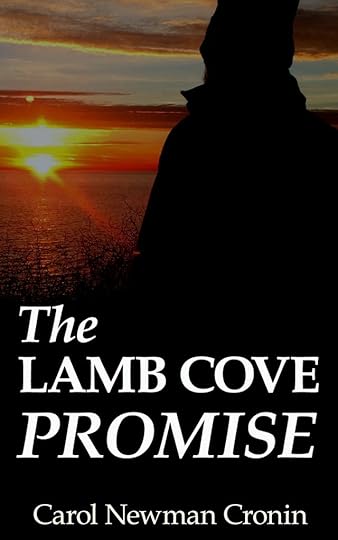
I began to write this story as a way to get to know Fisher Marty, the owner of the Brenton Boat Yard, who will (I think) figure prominently in the next novel. I soon realized it could also continue the gift-of-story tradition I started last year, which was enough incentive to keep working and polishing until it could stand on its own. The result is a much deeper understanding of another local character—and a 3000-word escape to Covid-free Cooperation Island.
Though the story is a little darker than my usual (perhaps a reflection of our uncertain times), it fulfills my promise of a happy ending and it definitely includes coastline and sailing. I hope it provides a pleasant diversion, and I look forward to your comments and emails.
Thank you for taking the time to read my posts and stories, and I can’t wait for a few in-person discussions about this quirky character once we can safely gather again. Meanwhile, I’m sending you cheer and best wishes from the shoreline of Narragansett Bay, wherever you find yourself today and whatever you might be celebrating tomorrow.
Lamb Cove PromiseDownload
The post Christmas Eve Circumnavigation: A Gift of Story appeared first on Carol Newman Cronin.
December 17, 2020
Writer Jane Sigal Talks About Eating to Understand
I love where I live, but I must admit: I’m pretty tired of my own cooking—and definitely missing the unexpected tastes and scents of travel. So, as my own personal holiday treat, I decided to ask my neighbor, Jane Sigal, a food writer for the New York Times, to share her own culinary inspirations and travel adventures. I never expected our masked backyard chat to give me a fresh insight into two of my best regatta memories.
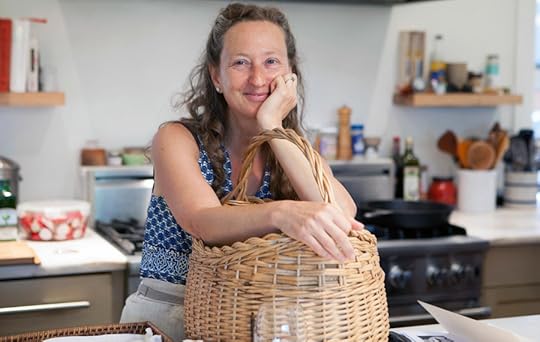
Here in her adopted home of Jamestown (which she describes, accurately, as a small island town with “around 5,000 people and one traffic light”), Jane is best known for her 2009 story about a trendy post-Thanksgiving leftovers party. (In case you’re wondering, I’ve never scored an invite.) New York Times readers were introduced to a wide variety of prominent locals (many of whom had happily ditched big city life), all food-ified by descriptions of the elaborate refashionings that turned each leftover into a dish worthy of the annual event. “That was really, really fun,” Jane says, “because I got to interview everybody in Jamestown. It was so local, and yet it was in the New York Times!” (Read The Remains of the Day, with apologies if there’s a paywall.)
Off the island, she’s known as “the hamburger lady” because of a 2008 article (In Paris, Burgers Turn Chic). “Now you find [hamburgers] everywhere,” Jane explains. “But then it was this kind of mysterious foreign thing, and they were eating it with a knife and a fork. It was just hilarious. Americans think of the French as so high-brow… it was really about the two clashing cultures.” The article has since been translated into several other languages, and years later it is still widely read and shared.
Eating to understand
Jane went to cooking school in France and has translated and written several cookbooks, but her favorite projects involve immersion in a local culture. “What’s interesting for me is to talk to other people who are really talented or have some interesting history, and then translate it.” A literal translation, usually, but always a cultural one; by helping us to understand how others cook, she also helps us understand how they live.
The best and most personal example comes from a more recent article in Food and Wine—which unexpectedly stirred up memories of two of my favorite regatta meals. Here’s how Jane explains barbecue’s prominence in Argentine culture:
“Multiple weekly cookouts are the norm—on Sunday afternoons with the family, in a friend’s backyard, on the way to the beach at a roadside joint, at work as a team-building exercise, or even on a building site, urban gaucho-style, using construction discard for fuel.”
(Italics mine.) Read more
A Feast of Memories
The best barbecue I ever ate wasn’t at a building site, but urban gaucho-style definitely applies. After a particularly windy day of sailing at the 1996 Snipe Western Hemispheres in Montevideo, Uruguay, Team Argentina somehow cobbled together a few grills in a nearby boat yard and grilled up a feast for their forty competitors. I will never forget leaning against a boat stand in the dark, munching on fresh-charred ribs and sausages, licking my greasy fingers (and then likely wiping them clean on my shorts). Yum.
Twenty years later, a new generation of Argentine sailors showed up at a cookout hosted by my teammate Kim and her husband. They were carrying a huge slab of beef and asked, casually, “Do you have a grill?” The resulting feast inspired a running joke: “If an Argentine ever asks to cook, tell him yes!”
Dreaming of Travel
With no international adventures available right now, Jane’s not sure what comes next. “What I’d really like to do is travel to Mexico and work in a kitchen there, so that I can really learn the food vocabulary. Last year, right before COVID dropped, I was actually living in Wahaca and going to school, but I think it would be better to learn in a real environment where everybody is speaking Spanish and they’re not paying any special attention to me.” (She also admits to another dream: “I just can’t even believe the freedom that you would have as a fiction writer!”)
When I ask for a recipe she’d be willing to share with all of you, she isn’t sure at first that she can select just one. Then she remembers the recipe below from Backroad Bistros, Farmhouse Fare: A French Country Cookbook. “I’ve never seen it in this country… it’s so simple and so good.” I agree! You can find additional recipes (and much more about Jane and her many books) on her website.
Thanks Jane Sigal for taking me on a travel and cooking adventure—all without leaving our island!—and for giving me fresh insight into two of my best travel memories. Intriguing neighbors are all the more reason to love and appreciate where I live—even if I never manage to score an invite to that post-Thanksgiving leftovers bash.
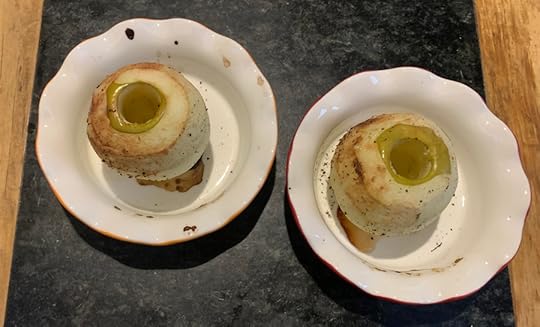
Pommes Cuites au Four (Savory Baked Apples)
4 servings
4 green apples, peeled and cored (or peeled, cored and halved lengthwise)
1/2 lemon
Salt and pepper
Heat oven to 425°. In a gratin dish just large enough to hold the apples, squeeze the lemon juice over them. Season with salt and pepper.
Bake until the apples are tender when pieced with a knife but still hold their shape, about 30 minutes.
The post Writer Jane Sigal Talks About Eating to Understand appeared first on Carol Newman Cronin.

